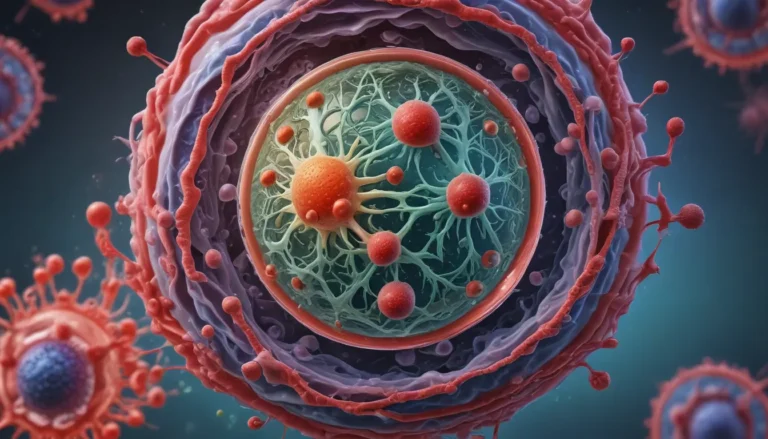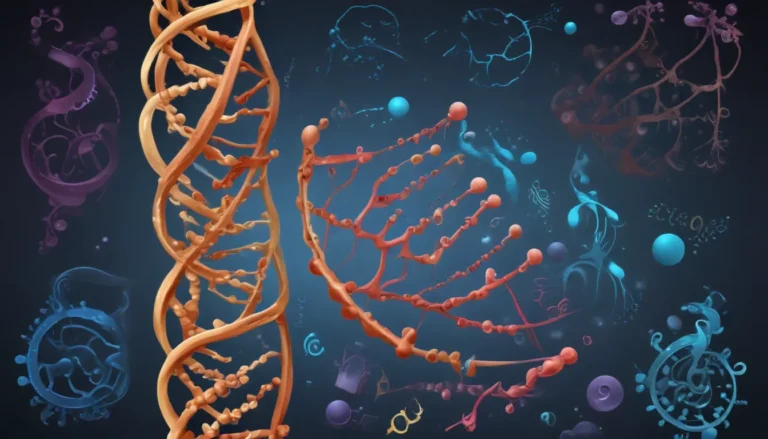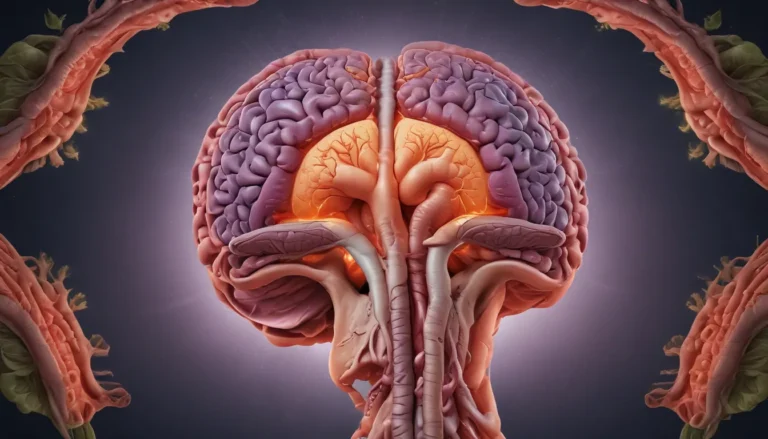A Note About Images: The images used in our articles are for illustration purposes only and may not exactly match the content. They are meant to engage readers, but the text should be relied upon for accurate information.
Proteome analysis is a captivating field within biological research that offers valuable insights into the complex world of proteins. By unraveling the mysteries of the proteome, researchers are able to delve into various biological processes, from understanding diseases to developing potential drug targets. In this article, we will delve into the realm of proteome analysis and uncover 17 intriguing facts that underscore its significance and diverse applications. Join us on a journey to explore the power and potential of proteome analysis in shaping our understanding of the intricate world of biology.
Understanding the Marvels of Proteome Analysis
Proteome analysis involves the comprehensive study of proteins expressed by a specific organism, tissue, or cell at a given time. This powerful tool provides valuable insights into the functions, interactions, and regulations of proteins within biological systems. By exploring the proteome, scientists can unlock a deeper understanding of the complex mechanisms that govern life.
Unveiling the Complexity of the Human Proteome
The human proteome is a vast and intricate landscape consisting of hundreds of thousands of proteins, each with its unique structure and function. Studying the human proteome opens up new avenues for exploring various diseases and developing targeted therapies. Delving into this complexity allows researchers to decode the language of proteins and uncover hidden insights.
Harnessing the Power of Proteome Analysis for Biomarker Discovery
Proteome analysis serves as a valuable tool in identifying biomarkers by comparing the proteomes of healthy individuals and those affected by certain diseases. These biomarkers play a crucial role in early disease detection, monitoring treatment responses, and predicting disease outcomes. It’s like deciphering a secret code that holds the key to improving healthcare and enhancing our quality of life.
The Role of Mass Spectrometry in Proteome Analysis
Mass spectrometry stands as a cornerstone technique in proteome analysis, enabling researchers to identify and quantify proteins in complex samples. This cutting-edge technology facilitates the precise determination of protein fragments’ mass-to-charge ratio, leading to accurate protein identification. The power of mass spectrometry lies in its ability to unravel the intricate patterns of proteins within biological systems.
Illuminating Drug Discovery Through Proteome Analysis
Proteome analysis plays a pivotal role in drug discovery by unveiling potential drug targets through a comprehensive understanding of the proteome of target organisms or cells. This approach has revolutionized the field of personalized medicine, paving the way for tailored therapeutic interventions that address individual needs. The marriage of proteome analysis and drug discovery holds immense promise for advancing healthcare practices.
Decoding Post-Translational Modifications Through Proteome Analysis
Post-translational modifications (PTMs) are chemical alterations that occur on proteins after their synthesis. Proteome analysis techniques enable scientists to identify these PTMs, shedding light on protein function and regulation. By unraveling the intricate world of PTMs, researchers gain valuable insights into the dynamic nature of proteins and their role in biological processes.
Embracing the Evolution of Proteomics
The field of proteomics is in a constant state of evolution, with new techniques and technologies emerging to enhance the sensitivity, speed, and accuracy of proteome analysis. These advancements push the boundaries of our understanding of complex biological systems, paving the way for innovative discoveries and breakthroughs. The dynamic nature of proteomics underscores its significance in shaping the future of biological research.
Pioneering Aging Research Through Proteome Analysis
Studying changes in the proteome during the aging process offers valuable insights into the underlying mechanisms of aging and age-related diseases. This knowledge holds the potential to drive the development of interventions that promote healthy aging and enhance quality of life. Proteome analysis serves as a beacon of hope in unraveling the mysteries of aging and unlocking the secrets of longevity.
Leveraging Proteome Analysis for Cancer Diagnosis
Abnormal protein expression patterns often manifest in cancer cells, offering valuable clues for diagnosis and prognosis. By analyzing the proteome of cancerous tissues, researchers can identify specific protein markers that aid in cancer diagnosis and treatment planning. Proteome analysis plays a pivotal role in the fight against cancer, offering new avenues for precision medicine and personalized care.
Exploring Proteome Analysis in Forensic Science
Proteomic techniques are harnessed in forensic investigations to identify biological materials left at crime scenes. By analyzing protein profiles, forensic scientists can determine the sample’s source and gather crucial evidence for solving crimes. Proteome analysis serves as a powerful ally in forensic science, offering unique insights into the mysteries of criminal investigations.
Unraveling Drug Resistance Through Proteome Analysis
Comparative analysis of drug-sensitive and drug-resistant cells enables researchers to uncover the mechanisms behind drug resistance and develop strategies to overcome it. Proteome analysis sheds light on the intricate interplay of proteins in drug resistance, offering a deeper understanding of this phenomenon. By deciphering the proteomic landscape, researchers can pave the way for more effective therapeutic interventions.
Nurturing Agricultural Research Through Proteome Analysis
Studying the proteomes of crops plays a vital role in identifying proteins involved in stress responses, disease resistance, and nutrient uptake. This knowledge contributes to the development of improved crop varieties with enhanced traits and resilience. Proteome analysis serves as a beacon of hope in enhancing agricultural practices and ensuring food security for future generations.
Mapping Protein-Protein Interactions Through Proteome Analysis
Proteins rarely act alone but engage in intricate interactions with other proteins to carry out their functions. Proteome analysis techniques enable the identification and mapping of protein networks, offering valuable insights into cellular processes. By unraveling the complex web of protein-protein interactions, researchers gain a deeper understanding of biological pathways and mechanisms.
Unveiling the Diversity of Protein Isoforms Through Proteome Analysis
Proteins can exist in various isoforms, derived from the same gene but possessing unique properties. Proteome analysis plays a crucial role in identifying and quantifying these isoforms, shedding light on their roles in health and disease. By exploring the diversity of protein isoforms, researchers gain a comprehensive understanding of the functional landscape of proteins within biological systems.
Harnessing High-Performance Computing in Proteome Analysis
The analysis of large-scale proteomic data demands robust computational tools and algorithms to handle the complexity of protein analysis. High-performance computing stands as a cornerstone in processing, storing, and interpreting proteome data, enabling researchers to unravel the intricate patterns within biological systems. The power of high-performance computing fuels the progress of proteome analysis and drives innovative discoveries in biological research.
Identifying Protein Targets for Drug Development Through Proteome Analysis
Studying the proteomic profile of cells or tissues under specific conditions offers valuable insights into identifying potential drug targets. This knowledge guides the development of new therapeutic interventions tailored to address specific diseases or conditions. Proteome analysis serves as a compass in drug development, leading the way towards precision medicine and targeted therapies.
Embracing Collaboration in Proteome Analysis
Proteome analysis thrives on collaboration, bringing together researchers from diverse disciplines such as biology, chemistry, and bioinformatics. This multidisciplinary approach fosters innovation and drives significant advancements in our understanding of the complex proteome. By embracing collaboration, researchers can unlock new insights and push the boundaries of biological research.
In conclusion, proteome analysis stands as a powerful tool that has reshaped the landscape of biology. By delving into the intricacies of protein expression, researchers can unlock valuable insights into disease mechanisms, develop targeted therapies, and enhance agricultural practices. As technology continues to advance and techniques evolve, proteome analysis will undoubtedly play a pivotal role in shaping our understanding of the intricate world of proteins.
Final Thoughts
Proteome analysis is a captivating field that holds immense potential for advancements in biology and medicine. By unraveling the intricate world of proteins, researchers can gain valuable insights into cellular functioning, disease mechanisms, and therapeutic targets. With continuous advancements in technology and breakthroughs in analytical techniques, proteome analysis is poised to revolutionize how we approach healthcare and scientific research.
FAQs
- What is proteome analysis?
-
Proteome analysis involves the study of the complete set of proteins present in a given sample or organism. It encompasses the identification, quantification, and characterization of proteins to unravel their roles and functions in biological systems.
-
What techniques are used in proteome analysis?
-
Proteome analysis often relies on mass spectrometry, a technique that enables the identification and quantification of proteins based on their mass and charge. Other techniques include protein separation methods such as gel electrophoresis and liquid chromatography.
-
What are the applications of proteome analysis?
-
Proteome analysis finds applications in various fields including biomedical research, drug discovery, disease biomarker identification, and personalized medicine. It aids in understanding disease mechanisms, identifying potential drug targets, and monitoring therapeutic responses.
-
How can proteome analysis contribute to personalized medicine?
-
Proteome analysis offers valuable insights into an individual’s protein profile, enabling personalized diagnosis, treatment selection, and disease progression monitoring. It facilitates tailored therapies that address individual needs, optimizing treatment outcomes.
-
What are the challenges in proteome analysis?
- Proteome analysis presents challenges such as the complexity of the proteome, dynamic range of protein expression, sample preparation variability, and data analysis hurdles. However, advancements in technology and bioinformatics tools continually enhance the accuracy and efficiency of proteome analysis.
Proteome analysis is a captivating realm within the broader landscape of biological research, offering valuable insights into the intricate world of proteins. Delving into proteome analysis unveils a treasure trove of knowledge that can revolutionize healthcare, agriculture, and scientific discovery. As we navigate the evolving field of proteomics, we discover new horizons of understanding and innovation that promise to shape the future of biological research and redefine the boundaries of human knowledge.






